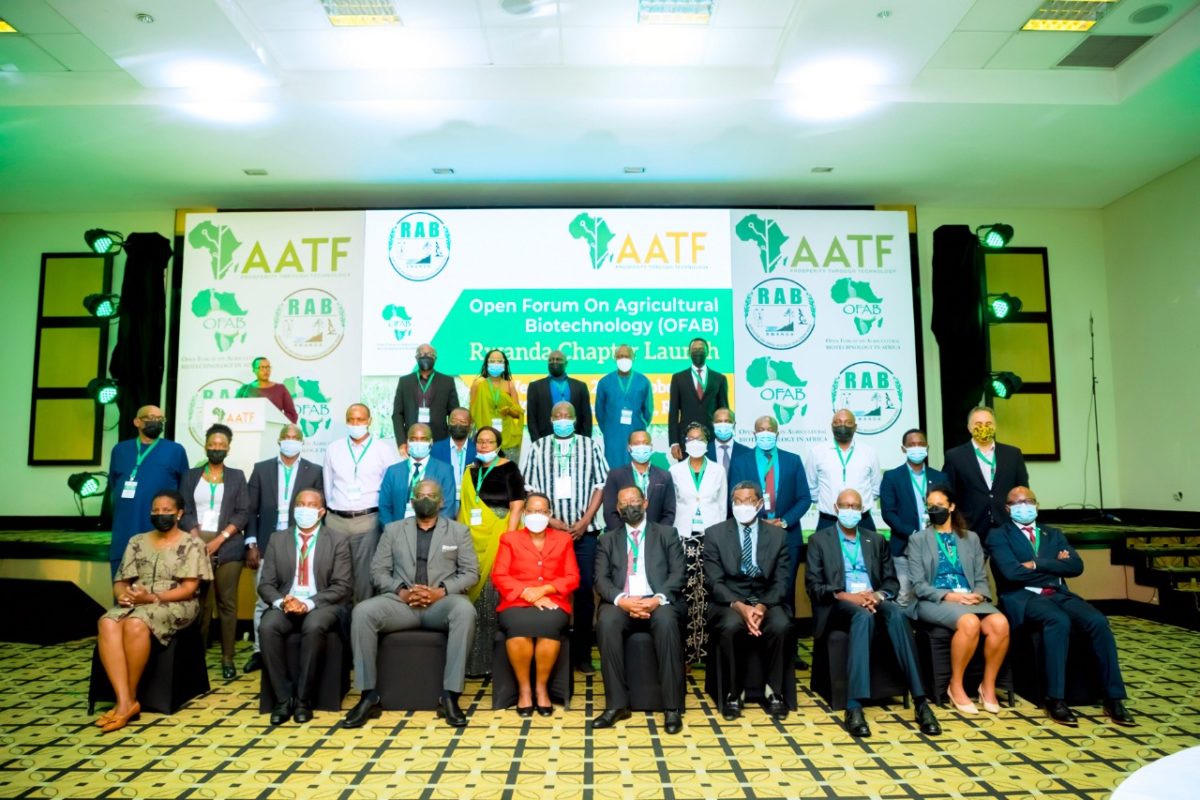Rwanda signaled its growing receptivity toward agricultural biotechnology this week as it joined seven other African countries — Burkina Faso, Ethiopia, Ghana, Kenya, Nigeria, Uganda and Tanzania — in forming a country chapter of the Open Forum on Agricultural Biotechnology (OFAB).
“By embracing technological upgrading and building capacity for our farmers and rural value chain actors, I believe they will make informed decisions to be at par with the rest of African countries who are already benefiting from agricultural biotechnology, such as South Africa, Kenya, Nigeria, among others,” said Dr. Geraldine Mukeshimana, Rwanda’s Minister for Agriculture and Animal Resources.
Africa has yet to adopt agricultural biotechnology in an optimal way as one of the solutions to food production challenges, Mukeshimana said.
“As a continent, we are still hesitating due to the bad press GM (genetically modified) products have received for the past decades,” she said. “It is worth noting that the food import bill for Africa rose to US$49 billion in 2019 from US$35 billion in 2015. We need to use homegrown scientists’ innovations to help reduce the food import bill and to repurpose these savings to other socio-economic programmes.”
By joining OFAB, Rwanda has achieved a great milestone that allows agricultural stakeholders to interact and share knowledge on crop and livestock biotechnology, she noted. “This knowledge is critical to the stakeholder who needs to make informed decisions amidst misconceptions about biotechnology,” Mukeshimana said.
OFAB was established by the African Agricultural Technology Foundation (AATF) in 2006 as a platform for advancing stakeholder interactions on agriculture biotechnology. OFAB also intends to expand its outreach through the establishment of new chapters in Malawi and Mozambique. AATF is an African-led NGO that works in 23 countries, including Rwanda, to empower smallholder farmer through access to technologies that can improve their livelihoods
Biotechnology is the most suitable tool to spur sustainable development in Africa, Mukeshimana said, noting that the OFAB collaboration puts Rwanda on the same level as other African countries that are using various platforms to engage the public about opportunities in biotechnology to mitigate agricultural production challenges.
The Rwanda OFAB chapter will be hosted by the Rwanda Agriculture and Animal Resources Development Board (RAB) and will work to enhance awareness and science-based knowledge agricultural innovations.
The collaboration supports Rwanda’s commitment to improve the lives of its smallholder farmers as captured in its Strategic Plan for Agriculture Transformation-2018-2024 (PSTA4), said Dr. Canisius Kanangire, AATF executive director.
“Although Rwanda is active on the biotechnology front with tissue culture work, it is still not engaged in commercial production of any genetically modified crops,” Kanangire said. “But the country has made important steps towards establishment of the necessary legal and regulatory framework through the Biosafety Law, as well as the National Strategy for Implementation of Biosafety Framework.
With the launch, Rwanda agriculture stakeholders will get a chance to participate in conversations on the role of science technology and innovation, particularly biotechnology, in the transformation of agriculture in Africa. The establishment of the OFAB Rwanda chapter will also help close the information gap around agricultural biotechnology and demystify the attendant myths and misconceptions.
Dignitaries gather at the launch of the Rwanda OFAB chapter. Photo: AATF
The Rwanda OFAB chapter launch comes at a time when Africa’s agriculture-dependent economy is facing myriad production challenges, including climate change, new pests and diseases and finite farm land. These challenges require special attention to enable optimal production yields that are also friendly to the environment.
The agricultural sector constitutes 32 percent of the continent’s Gross Domestic Product, according to Dr. Emmanuel Okogbenin, director of Program Development and Commercialization at AATF, in a recent article published in the journal Afrika Focus. The ongoing agricultural transformation agenda in Africa hinges on a system change from subsistence farming to an agribusiness approach that explores high productivity to strengthen the African economy.
During the “Green Revolution” period in Asia, increased global yields of cereal crops were achieved through the interactions of breeding and agronomy. However, in the face of current challenges such as climate change and the need for new market niches, there is increasing urgency to explore modern plant breeding methods, including biotechnology.
Modern breeding methods can help develop new varieties with the capacity for high yields in reduced chemical-input systems while protecting the genetic diversity needed to maintain yield stability in Africa´s fluctuating climatic conditions.
Biotechnology, which includes innovative tools like double haploid technology, marker assisted breeding, genomics, genetic engineering and genome editing, has significantly shortened the time required to develop new cultivars, varieties and hybrids. These tools can help accelerate the development of market-responsive varieties needed for sustainable agriculture in Africa.
However, biotechnology needs a consistent information-sharing platform so that stakeholders can understand the technology and consequently choose innovations based on science amid the storm of propaganda and misinformation that surrounds the technology.
Dr. Jeremy Ouedraogo, coordinator of the African Biosafety Network of Expertise (ABNE), said the African Union and African Union Development Agency-New Partnership for Africa’s Development (AUDA–NEPAD) recognize modern biotechnology as a set of multifunctional tools that can facilitate achievement of the continent’s developmental goals. He added that AUDA-NEPAD is proud to be supporting the effort through ABNE, its flagship program.
“The role of OFAB is instrumental to ensure the acceptance by the general public and decision makers of the biotechnology principles and products,” he said. “AUDA-NEPAD is happy with the MoU signed with AATF, including OFAB, and will continue strengthening such partnerships through joint actions in all AU member state and especially in Rwanda.”
Image: Dr. Geraldine Mukeshimana, Rwanda’s Minister for Agriculture and Animal Resources, cuts the cake at the Rwanda OFAB launch. Photo: AATF
